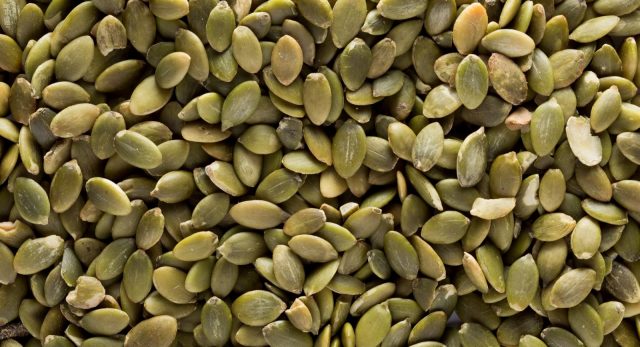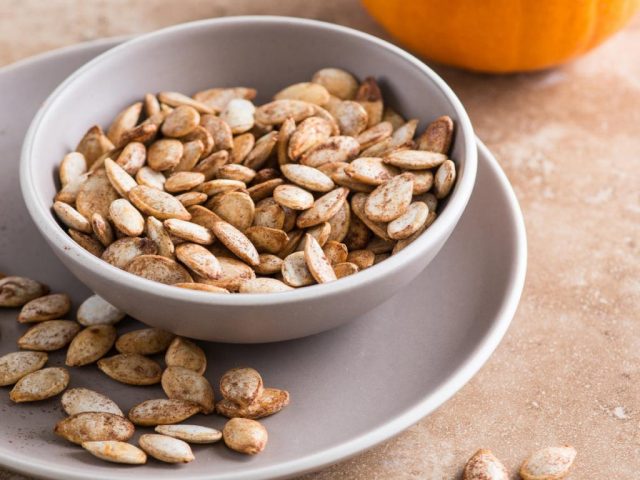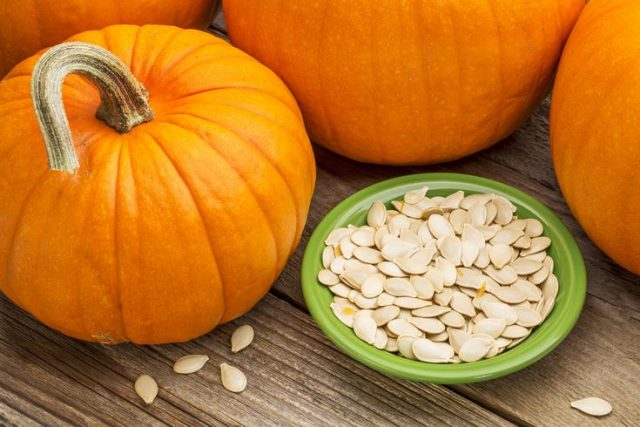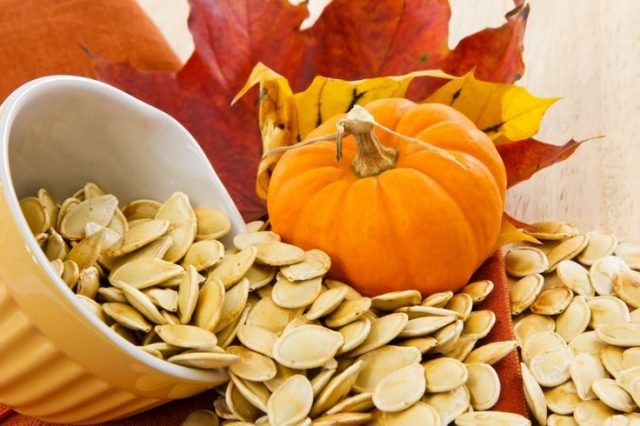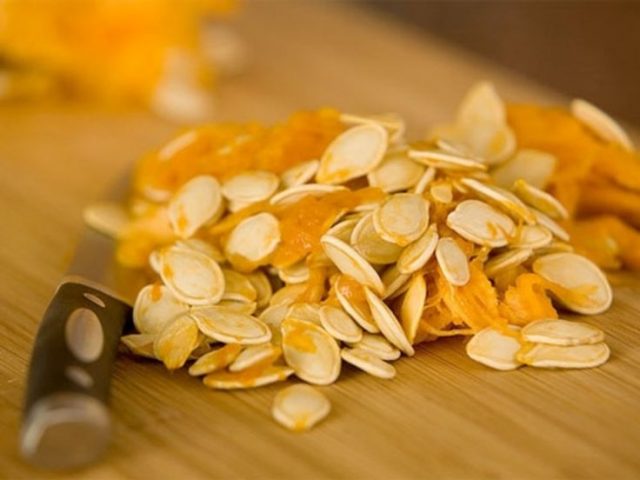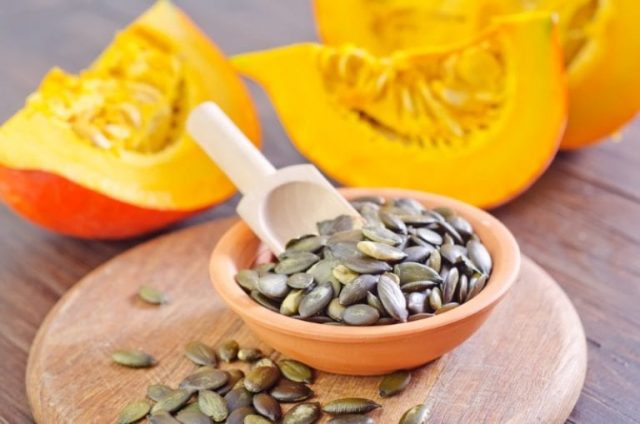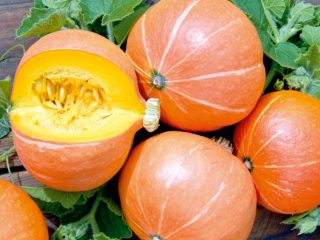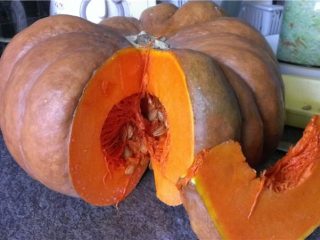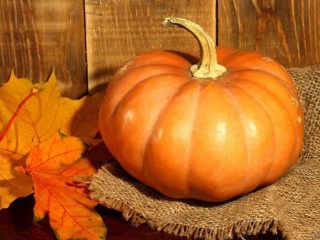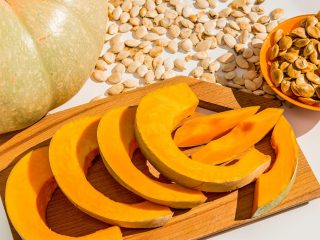Content
- 1 Nutritional value and chemical composition of pumpkin seeds
- 2 The benefits of pumpkin seeds for the body
- 3 What do pumpkin seeds help with?
- 4 Using the beneficial properties of pumpkin seeds
- 5 How to take pumpkin seeds correctly
- 6 Healing properties of decoctions and tinctures of pumpkin seeds
- 7 Restrictions and contraindications for taking pumpkin seeds
- 8 Conclusion
The benefits and harms of pumpkin seeds is an interesting question for lovers of tasty and healthy foods. You can quickly snack on pumpkin seeds, and at the same time the body will only receive benefits, which is guaranteed by the valuable composition of the seeds.
Nutritional value and chemical composition of pumpkin seeds
Small pumpkin seeds contain a lot of substances beneficial to the body. In addition to numerous vitamins, the composition contains:
- unsaturated acids - linoleic, arachidonic, oleic and others;
- phytosterols;
- pectin;
- Omega-6 and Omega-3;
- cellulose;
- amino acids - valine, isoleucine, histidine, lysine, tryptophan and arginine;
- iron - half the daily requirement;
- manganese and phosphorus;
- copper and zinc;
- iodine and selenium;
- cobalt, chlorine and silicon.
The product also contains saturated acids - myristic, behenic, arachidic, palmitic and others.
Vitamin content in pumpkin seeds
Pumpkin seeds contain a large supply of the most important vitamin compounds. Namely:
- vitamin PP;
- vitamins A and E;
- vitamin D;
- ascorbic acid;
- vitamins from subgroup B, in full from B1 to B9.
BJU content in pumpkin seeds
From a nutrient point of view, the energy value of pumpkin seeds is represented mainly by fats - about 45 g. Proteins account for a share of 24.5 g, and carbohydrates - about 20 g.
How many calories are in pumpkin seeds?
Despite their small size, healthy pumpkin seeds are a very nutritious product. The calorie content of pumpkin seeds is 540 kcal per 100 g.
How much zinc is in pumpkin seeds
The particular benefit of pumpkin seeds lies in their high zinc content. This element is found in many foods, but its amounts are usually small.But 100 g of pumpkin seeds contain 65% of the daily requirement of zinc, so the product is ideal for eliminating the deficiency of this element.
Which seeds are healthier: pumpkin or sunflower seeds?
Pumpkin seeds are less common than sunflower seeds, but they bring more benefits to the body. They contain huge amounts of phosphorus and large reserves of zinc. In addition, pumpkin seeds are lower in calories; 100 g of product contains approximately 40 kcal less than a similar serving of sunflower seeds.
Why do you want pumpkin seeds?
Most people have the desire to eat pumpkin seeds from time to time. But sometimes it becomes very strong, useful seeds turn into a real need. This is caused by the fact that the body experiences a shortage of valuable substances and seeks to eliminate it.
- The desire to eat pumpkin seeds may indicate a lack of vitamin E; its deficiency is expressed in dry skin and brittle hair, weakened muscles and mood swings.
- Also, a craving for pumpkin seeds can be caused by a deficiency of vitamin A; if there is too little of it in the body, immunity may decrease, vision often deteriorates at dusk, nails break and skin cracks.
- Healthy seeds are rich in B vitamins, so the desire to eat more of them often arises when there is a lack of substances from this group. You can suspect a deficiency of B vitamins if the condition of the nervous system has worsened - insomnia and increased irritability, chronic fatigue and muscle weakness have appeared.
The need for the product is caused by a lack of minerals, primarily magnesium and zinc.Symptoms include frequent colds, muscle cramps, dry skin and dull hair, and loss of appetite.
The benefits of pumpkin seeds for the body
The benefits and harms of pumpkin seeds for the body are very wide and varied. If used frequently, seeds:
- improve the condition of the circulatory system and protect blood vessels from the development of atherosclerosis;
- prevent the occurrence of heart diseases;
- reduce blood cholesterol;
- have a beneficial effect on the nervous system, normalize mood, improve brain performance, eliminate insomnia and symptoms of stress;
- have a rejuvenating effect, vitamin E in the product effectively slows down the aging process;
- normalize digestion; eating seeds is very useful for healthy metabolic processes and rapid absorption of valuable substances.
Since the healthy product contains a lot of zinc and selenium, the seeds can serve as a prevention of cancer.
What are the benefits of pumpkin seeds for women?
Pumpkin seeds bring benefits and harm to the female body - first of all, the product alleviates the condition during menopause and makes it easier to endure painful critical days. When consumed regularly, the seeds serve to prevent infertility and also protect a woman from the appearance of polyps and other tumors in the uterus.
Another valuable property of seeds is their beneficial effect on a woman’s appearance.The product helps improve hair condition and get rid of dandruff, has a cleansing effect on the skin and prevents rapid aging.
Is it possible to eat pumpkin seeds during pregnancy?
During pregnancy, pumpkin seeds are classified as permitted foods. Their benefit lies in the fact that the seeds help cope with attacks of nausea and heartburn, and prevent the development of constipation. Also, consuming the product is useful for strengthening the immune system and as a prevention of vitamin deficiency - most women begin to experience vitamin deficiency while carrying a child.
At the same time, pregnant women need to observe the measure and eat no more than 100 g of healthy product per day. Exceeding recommended dosages may be harmful and lead to diarrhea and flatulence.
What are the benefits of pumpkin seeds for children?
In children's diets, pumpkin seeds are useful primarily as a product that prevents the development of constipation. Fiber and fatty acids in seeds accelerate metabolic processes and contribute to the timely removal of toxins from the intestines. The benefit of the product for children is that pumpkin seeds strengthen the child’s immunity and vision, improve the functioning of the brain and nervous system.
However, you can give seeds to children only after reaching 3 years of age. The digestive system of babies is very sensitive, and earlier the child simply will not be able to digest a product with high fat content. In addition, the baby may choke on the seeds, which will also cause severe harm.
Benefits for older people
Some properties of pumpkin seeds are especially valuable for older people. First of all, the product improves digestion and prevents the accumulation of toxins in the intestines; older people often suffer from constipation. In addition, pumpkin seeds have a rejuvenating effect and slow down the aging process of the body.
What do pumpkin seeds help with?
The medicinal properties and contraindications of pumpkin seeds are used in traditional medicine to treat many ailments. Among them are:
- constipation and slagging of the body;
- insomnia, increased irritability and other nervous disorders;
- hypertension;
- osteoporosis and other joint diseases;
- avitaminosis;
- gastritis of acute and chronic type;
- heartburn and increased stomach acidity;
- metabolic disorders in the body;
- cystitis;
- chronic diseases of the liver and kidneys.
Eating pumpkin seeds is useful if you are prone to heart rhythm disorders, high cholesterol and skin diseases. The product will also be beneficial in case of cancer or a high risk of tumors.
Using the beneficial properties of pumpkin seeds
In the absence of contraindications, the product has a positive effect on all systems of the human body. However, the benefits of the product for certain diseases and conditions are especially great, and it is worth considering in more detail.
For the cardiovascular system
Many people suffer from high cholesterol, which often leads to thickening of the blood, arrhythmia and a tendency to form blood clots. Pumpkin seeds lower cholesterol and prevent clogging of blood vessels.In addition, the product lowers blood pressure, thins the blood and prevents the development of severe heart diseases. Frequent consumption of pumpkin seeds reduces the risk of heart attack and atherosclerosis, maintains vascular elasticity and healthy blood flow.
For immunity
Zinc, present in pumpkin seeds, is a very important substance for health and is responsible for the good functioning of the immune system. Therefore, regular consumption of seeds improves the body's resistance to any viruses and infections. The immune system is activated to fight not only colds, but also any inflammatory and even oncological processes.
For gastrointestinal diseases
Pumpkin seeds for the intestines are one of the healthiest foods. They have a cleansing effect on the digestive system and help remove not only toxins from the body, but also toxic substances. Pumpkin seeds have a weakening effect, so they are considered a very effective remedy for constipation and help get rid of flatulence.
For gastritis
Pumpkin seeds for gastritis are allowed for consumption, provided that we are talking about a disease with low stomach acidity. In this case, the seeds will help increase the production of hydrochloric acid, speed up the digestion of food and relieve the feeling of heaviness in the stomach.
But with high-acid gastritis, it is better to avoid using the product. In addition to the fact that increased gastric secretion in this case will be harmful, the seeds can also cause mechanical damage to irritated mucous membranes. You can eat them in small quantities only during the period of remission of the disease.
For gout
Pumpkin seeds can be beneficial for gout; they relieve inflammatory processes in tissues and joints, and help remove harmful substances and salt deposits from the body. But they can be consumed only during the period of calm progression of the disease; during an exacerbation, the product will have to be excluded from the diet.
A useful property of seeds is their high nutritional value, with which you can quickly satisfy your hunger. It is highly recommended that gout patients not go hungry, and pumpkin seeds make an excellent healthy snack for those situations when there is no time for a full meal.
For the liver
Pumpkin seeds are very useful for the liver; they are rich in vegetable fats, which activate the process of natural restoration and renewal of this organ. You can use the seeds if there is insufficient bile production or toxic liver damage, with frequent alcoholic libations; pumpkin seeds will protect liver cells from destruction and prevent the occurrence of serious illnesses.
For psoriasis
Pumpkin seeds are highly recommended for use for psoriasis because they contain a large amount of zinc. In turn, zinc promotes the production of special protein compounds that accelerate skin regeneration. Pumpkin seeds are one of the best sources of useful microelements - they contain much more zinc than eggs or legumes.
For hemorrhoids
Pumpkin seeds are beneficial for hemorrhoids because they indirectly help cure the disease. One of the main causes of hemorrhoids is frequent constipation, and the seeds have a laxative effect and help normalize stool.Regular and easy bowel movements have a positive effect on the condition of the veins in the rectum and prevent the occurrence of hemorrhoids.
For constipation
Reviews about pumpkin seeds for constipation are only positive. The high fiber content in the product enhances peristalsis, so pumpkin seeds eliminate problems with bowel movements. The constant presence of pumpkin seeds in the diet allows you to solve the problem of constipation, even if you consume the product in minimal daily quantities.
For depression and stress
Pumpkin seeds contain the beneficial amino acid tryptophan in large quantities. In the human body, it is processed into serotonin - the so-called “happiness hormone”. Thus, pumpkin seeds are an effective cure for depression and anxiety; they improve mood, restore vigor and a calm mood.
For the prevention of cancer
Oncological diseases often occur against the background of weakened immunity and slow renewal processes in the body. Pumpkin seeds contain a lot of zinc and selenium, both of these substances are powerful antioxidants responsible for rapid cell regeneration and rejuvenation. Regular consumption of pumpkin seeds helps to significantly reduce the risk of developing cancer.
How to take pumpkin seeds correctly
In order for peeled pumpkin seeds to bring only benefits to the body, they must be consumed according to a proven scheme. The daily amount of seeds and the method of processing them are of great importance.
Which is healthier: raw or fried?
Many people prefer to eat roasted seeds because they have a more attractive taste. However, pumpkin seeds that have undergone heat treatment lose most of their beneficial properties.
When frying, pumpkin seeds destroy vitamins and evaporate essential oils, and fatty acids oxidize and become harmful to the body. The bactericidal and immunostimulating properties of the product weaken, and with frequent use, fried seeds provoke the deposition of salts in the joints and the appearance of edema. Thus, raw pumpkin seeds are definitely healthier.
How many pumpkin seeds should you eat per day?
The benefits of the product for the body depend on the amount of seeds consumed. It is recommended to eat no more than 100 g of seeds per day; in case of an overdose, diarrhea, flatulence, nausea and other unpleasant symptoms may occur.
Can I eat pumpkin seeds with the skin on?
The hard peel does not contain toxic substances, but it still cannot be eaten together with the seed kernels. Due to its dense structure, it is not digested by the stomach, so it only clogs the body and can scratch the mucous membranes of the internal organs.
Healing properties of decoctions and tinctures of pumpkin seeds
Pumpkin seeds have a beneficial effect on the body when consumed in their pure form. But for the treatment of individual ailments, it is better to prepare medicines based on seeds, so their benefits will be more pronounced.
Recipes for healing tinctures
The seeds are especially beneficial when used in alcoholic tinctures; their valuable properties are enhanced when mixed with an alcohol base.Traditional medicine offers several recipes for a strong tincture of pumpkin seeds.
- For heart ailments. About 150 g of raw seeds are peeled and crushed in a blender, and then pour 500 ml of vodka. The mixture is infused for a week in a dark and cool place, and then filtered and poured into another vessel. You need to take the medicine once a day, a couple of teaspoons, after diluting the product in a glass of water.
- To cleanse and thin the blood. The healthy seeds in the amount of 5 glasses are crushed, then pour 500 ml of high-quality vodka and add fresh lemon juice to the tincture. The product is infused in the dark and cool for 3 weeks, and then filtered and drunk three times a day on an empty stomach, 1 large spoon.
- From alcoholism. About 100 g of dry pumpkin seeds are ground in a blender to a powder, pour in 500 ml of moonshine or vodka and add another 50 ml of bay infusion. Infuse the product in a cool, shaded place for a week, and then take 30 ml on an empty stomach up to 3 times a day.
- For the intestines and liver. About 50 g of raw seeds are mixed with 60 g of dried wormwood, crushed into powder and poured with 250 ml of vodka. For 2 weeks, the product is removed to infuse in a dark place, and then filtered and taken 50 ml twice a day on an empty stomach, without drinking water.
Pumpkin seed decoction recipes
Decoctions of pumpkin seeds in water are also very beneficial for the body and help with heart, nervous and digestive disorders.
- A decoction for insomnia and stress. Seeds in the amount of 3 large spoons are poured into 300 ml of water, boiled over low heat for about 5 minutes and left until the liquid has cooled. You need to take 1/4 cup of the decoction shortly before bedtime; the treatment is continued for 2 weeks.
- A decoction to relieve constipation. A small spoon of seeds is poured into 150 ml of hot water, left covered for half an hour, and then filtered. You need to take pumpkin seeds on an empty stomach in the form of a decoction, 2 large spoons twice a day - within 24 hours the decoction should have its beneficial effect.
You can use decoctions based on the product not only for treatment, but also for preventive purposes - this will strengthen your vision, improve your immunity and increase your performance.
Restrictions and contraindications for taking pumpkin seeds
In most cases, pumpkin seeds are beneficial. However, sometimes pumpkin seeds can be harmful to the human body; the product has a number of contraindications.
First of all, you should not take the seeds if you are allergic, both to the seeds themselves and to the pumpkin pulp. You should also discard the product if:
- tendency towards obesity;
- increased stomach acidity;
- acute pancreatitis;
- peptic ulcer in a state of exacerbation.
You need to be careful when consuming seeds if you are prone to diarrhea - the laxative effect of the product can cause serious intestinal upset.
Conclusion
The benefits and harms of pumpkin seeds are determined by the presence or absence of contraindications and the volume of product consumption. Eating raw pumpkin seeds in small dosages will only provide health benefits, especially for the digestive system.
